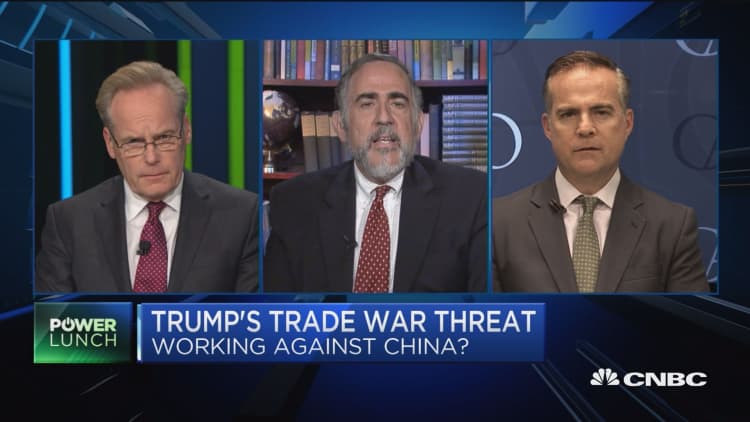
President Donald Trump's latest plan to take action against China over trade issues has some watchers worried about a trade war.
Others say Trump is on the right track in his efforts to retaliate against the United States' largest trading partner for alleged violations.
"I don't think he's been tough enough ... and in fact, I don't think he's been smart enough," Alan Tonelson, founder of RealityChek, said on Monday.
"What he's been trying to do, it seems to me, has been to try to develop responses that haven't been tried in the past and already failed. I give him a great deal of credit for that, although certainly the actual implementation has been lacking," Tonelson said on CNBC's "Power Lunch."
Last week, the White House reportedly engaged in serious discussions about implementing a trade tool, Section 301 of the 1974 Trade Act, to retaliate against China. Section 301 allows the president to impose steep tariffs on imports, rescind licenses or take other measures against a trade partner if an investigation finds it imposed burdensome or unfair restrictions on American commerce. This move can be implemented without the World Trade Organization's approval.
Section 301 has yet to be widely used since the creation of the WTO, and many worry implementing the move could result in a trade war.
"[With a 301 move], the U.S. identifies what the problem is, crafts a solution and implements it" unilaterally, Dan Ikenson, director of the Cato Institute's Herbert A. Stiefel Center for Trade Policy Studies, said on "Power Lunch."
"That would violate our own WTO commitments and that would, in my view, set up a trade war because the United States would be abandoning its commitments and showing the rest of the world that the WTO is not worth anything, and it really is worth quite a lot," Ikenson said.
Instead, Ikenson recommends that America work with China and the WTO on finding trade solutions.
"Over the years I have advocated treading lightly with China. ... A lot of the complaints, a lot of the frictions in the relationship I think were sort of manufactured, but certainly there are some legitimate issues we have with China," Ikenson said.
"But there is a right way to deal with it and a wrong way," he said. "The right way is to avail ourselves of the World Trade Organization and identify the problems that China is creating, say, forced technology transfer."
Some companies have already voiced their concerns about future U.S. tariffs.
Foxconn, an Apple iPhone maker, announced last month that it plans to invest $10 billion to build a manufacturing facility in Wisconsin.
"[The Foxconn news] very well could be a big win for Trumpian trade policy because Foxconn's chairman, Terry Gou, specifically said that he decided to make this investment because he was worried about the threat of U.S. tariffs," Tonelson said. "And he's not the only CEO to say this."
Here are the states that would be hurt the most by a trade war with China.


